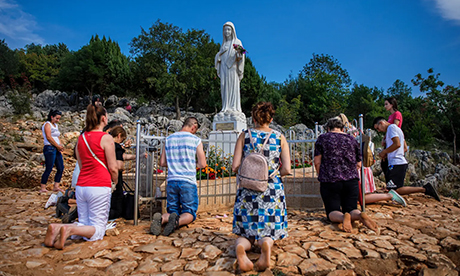The Vatican has approved pilgrimages to Medjugorje in Bosnia-Herzegovina, a significant site of alleged Marian apparitions, but has stopped short of declaring the visions authentic.
By issuing a decree of nihil obstat (literally “nothing stands in the way”), the Holy See “authorises prudent adherence” to the messages of Medjugorje but has not formally recognised the reality of the visions.
The ruling, issued by the Dicastery for the Doctrine of the Faith (DDF), encourages devotion while urging caution regarding the messages from alleged visionaries.
In 1981, six children from Medjugorje claimed to have received messages from the Virgin Mary. These visions sparked a global phenomenon, with millions of pilgrims visiting the site.
Although the Vatican now permits public devotion, it maintains a neutral stance on the supernatural nature of the events.
The Vatican’s decision highlights the spiritual fruits of Medjugorje such as conversions, renewed faith and an increased return to the sacraments.
Faithful are free to believe or not
Cardinal Víctor Manuel Fernández, prefect of the DDF, noted that the pilgrimages have brought many positive changes. These include more profound spiritual commitment and numerous vocations to religious life.
However he emphasised that these benefits come from the pilgrims’ experiences rather than direct interaction with the alleged visionaries.
“The upcoming messages will need to be analysed and, for now, they should not be considered true” Fernández said at a press conference.
Cardinal Fernandez added that the messages, when published, must be accompanied by a note from the DDF specifying that the faithful are free to believe or not.
Profoundly Catholic
While the Vatican appreciates the spiritual value of Medjugorje, it also cautions the faithful against certain messages. It said that positive experiences “occur mainly in the context of pilgrimages to the places of the original events, rather than during encounters with the ‘visionaries’ to witness the presumed apparitions”.
Some of these messages, particularly those involving strict instructions on practical matters, are deemed “misleading” and not of divine origin. The DDF warned that certain phrases, such as “my plan” and “my project”, attributed to Mary in the visions could create confusion over Christ’s central role in salvation.
Despite the precautions and reservations, the DDF declared that the essential experiences of the past 40 years at Medjugorje were “profoundly Catholic”.
“We see that God is doing good things” Cardinal Fernandez added.
Sources
Additional reading
News category: World.




